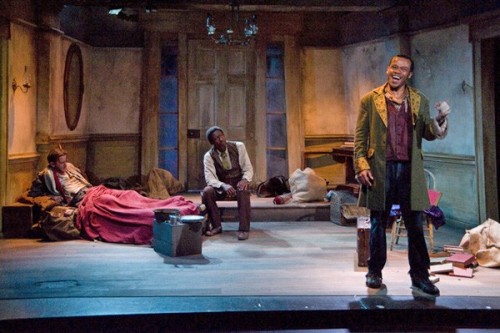The Whipping Man by Matthew Lopez
Boffo at Barrington Stage Company Through June 17
By: Charles Giuliano - Jun 10, 2010
The Whipping Man
by Matthew Lopez
Directed by Christopher Innvar
Scenic Designer – Sandra Goldmark, Costume Designer – Kristina Lucka, Lighting Designer Sandra Goldmark, Sound, Brad Berridge, Press Representative – Charlie Siedenburg, Casting Pat McCorkle, CSA, Stage Manager – Kate J. Cudworth.
Cast
Caleb – Nick Westrate
Simon – Clarke Peters
John – LeRoy McClain.
Two acts, five scenes. Two hours with intermission.
Barrington Stage Company Stage II
36 Linden Street, Pittsfield, MA.
May 26-June 17, 2010.
The Whipping Man by Matthew Lopez, which launches the season for Barrington Stage Company on its Stage II in Pittsfield, is a critical and audience hit. It was sold out last night when we attended the riveting and insightful production.
Julianne Boyd, the artistic director of the company, likes to greet audiences. She informed us that the play is sold out this week but there are a few seats left next week for the run through June 17. It must end to make way for a return of Freud’s Last Session the surprise hit of last season which was extended and then brought back. There will be a two week run of Freud, one more chance if you missed it, before it heads to Off Broadway in New York this summer.
She reminded us that Sweeney Todd, the bloody Sondheim musical, opens for previews of June 17 and will run for precisely one month through July 17 on Barrington’s Main Stage. It will be presented head to head with another Sondheim musical, A Funny Thing Happened on the Way to the Forum, featuring an all male cast, at Williamstown Theatre Festival. In the spirit of a Sondheim festival Barrington will also stage a youth production of Into the Woods off site. What’s not to like? Can you ever get enough of Sondheim?
If the smash hit Whipping Man is any indicator Barrington Stage, which proves to be recession proof, is on its way to another fabulous season. Boyd seems particularly apt at putting together programs studded with the shows that audiences really want to see. But with no compromise on artistic integrity.
The production of the Whipping Man is a case in point. The play conveys a wounded, Jewish, Confederate soldier crawling home and being dependent on two of his former slaves. It is ironic that they share his faith. The plot is more plausible than probable.
It is an obscure fact that there were Jews in the South who owned slaves, and fought to preserve their independence and way of life. The script by Matthew Lopez is a stretch. By suspending reality, and surrendering to the premise, you are immersed in a well crafted, complex, and wrenching theatrical experience. Every aspect of the production is flawless. This is simply theatre at its absolute best. It is precisely what Berkshire audiences have come to expect.
Perhaps the greatest surprise of this production is that Christopher Innvar, an actor in the company, is the director. He was seen last season as Stanley in Streetcar Names Desire. He has proven to me masterful in maintaining a crisp pace, white heat, and energy of the dialogue through two hours. After establishing the characters in the first act, the second act flew by in a spellbinding blur.
While all three actors- Clarke Peters as the slave Simon, LeRoy McClain as Nigger John, and Nick Westrate as Caleb, their physically and mentally wounded former owner- are superb it is Peters who provides the glue that binds their performances. He is the fulcrum and seer who balances their conflicts. Ultimately he is the only one who is truly liberated by emancipation. In the end it is he alone who is free at last.
Barrington’s production values are stunning. Within the limited confines of a small and adapted stage Sandra Goldmark has created a perfectly grimy and dismal set. The formerly gracious home has been looted and drained of all its former glory. It is a bombed out shard and signifier of grim survival. Simon has returned and taken possession surviving on scrounged flour and some produce from the garden. The lighting by Sandra Goldmark and sound by Brad Berridge richly enhance the drama. We much enjoyed the interval passages of bluesy guitar. The eclectic mix of costumes by Kristina Lucka evoked the mood and period.
It is April and just days after the Confederate surrender at Appomattox. It develops that Caleb may have deserted which explains why he refuses to be taken to an army hospital. It appears that he snapped during the siege of Petersburg, Virginia which was fought from June 9, 1864, to March 25, 1865. While General Grant refused to attack or retreat the Confederate troops festered in putrid trenches.
Simon insists that his leg must be amputated or he will die in a day or two. Caleb refuses until Caleb, who knows of these injuries, describes the excruciating pain and inevitable death that is far worse than the butchery. John has liberated goods from abandoned homes, including whiskey. It is the only anesthetic available.
The three men are brought together by fate and circumstance. Caleb lost his faith when God abandoned him on the battle field. What sustained him were love letters to his slave Sarah. She is the daughter of Simon and Elizabeth. Both Caleb and Simon are waiting and hoping for their return home. But John knows that they were sold by Caleb’s father. In a mordant scene he reveals this to the stricken Caleb.
It occurs to Simon that it is Passover and he organizes a patched together Seder. The depth of his faith is stunningly revealed. The Seder has the intense significance that it celebrates the liberation of the Jewish people from bondage in Israel. There are layers of irony as Simon and John are Jews as well as slaves owned by Jews. Being Jews, with its legacy of bondage and persecution, did not prevent Caleb and his father from inflicting the same cruelty as Christian Southerners. They may have been better than other masters but not by much.
John speaks grimly of being taken to the Whipping Man by Caleb. At first Caleb stopped the punishment. John thought he was saved. Only to learn that Caleb insisted on participating in the whipping. Clearly, that’s not Kosher. Caleb protests that he vomited after the incident.
When the denouement occurs Caleb prevails on Simon that he loved Sarah who is carrying his child. Simon reveals that he was not blind to what was going on. But will not have any notions of romance. “How could you love her” he asks. “You owned her and her children.” It begs the question; did Thomas Jefferson love his slave/ mistress Sally Hemmings? Certainly she had no options in their relationship. Their children served as his household slaves.
Clarke Peters is simply astonishing in this role. He is readily familiar to audiences for his well crafted supporting roles in such TV dramas a HBO’s The Wire, the PBS series Prime Suspect, as well as Life on Mars and Damages. There is a smoldering, understated intensity to his evenly paced and unifying performance. He is illiterate but worldly and nuanced compared to the raw John who learned to read. John devours books, some of the loot he has acquired, but seems to learn nothing in the process.
This is the first appearance by Peters with an American regional company. He has considerable experience with British stage companies. That discipline and training is richly evident in this galvanic performance.
While Peters may prove to have provided one of the finest performances of a still young Berkshire season that takes nothing from the fine work of McClain and Westrate. Innvar has succeeded in meshing them into a stunning and compelling company.
The audience burst into spontaneous applause during Westrate’s battlefield soliloquy. He vividly describes the horrors of war, the loss of his faith, and desperate longing for Sarah. It was a stunning scene which opened the emotional roller coaster of the second act.
The standing ovation in this case was richly deserved. For once it was not just a knee jerk reaction. It was a sober and thoughtful experience that will linger in our hearts and minds. The play provided us with the leverage to deal differently with our demons and the lingering, horrific legacy of slavery and hate in America. From which nobody escapes alive.






